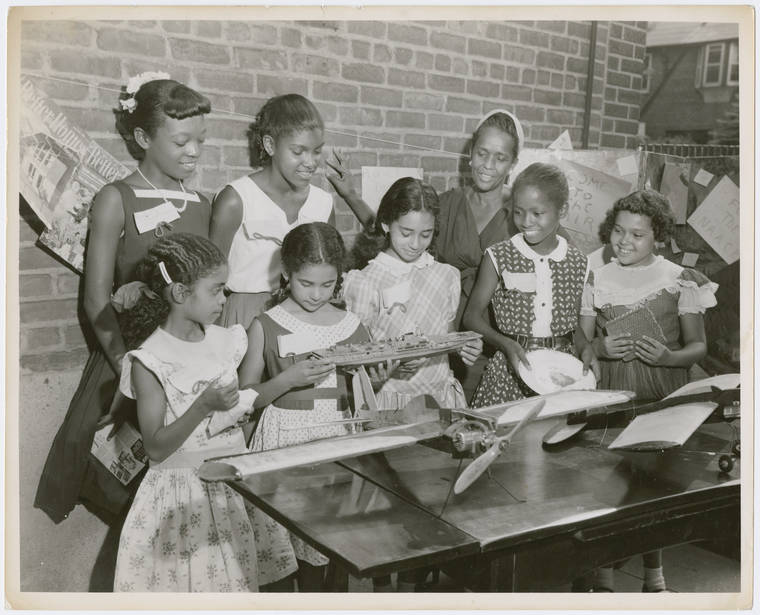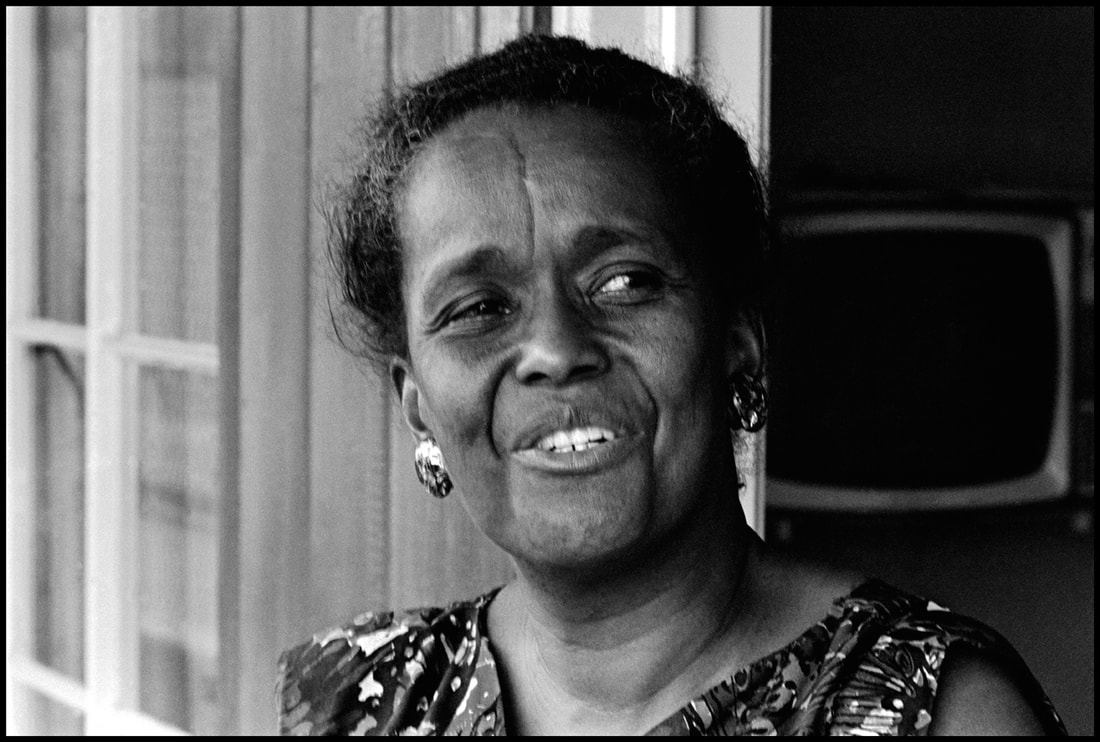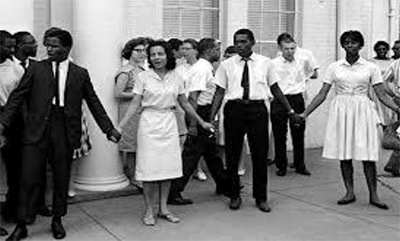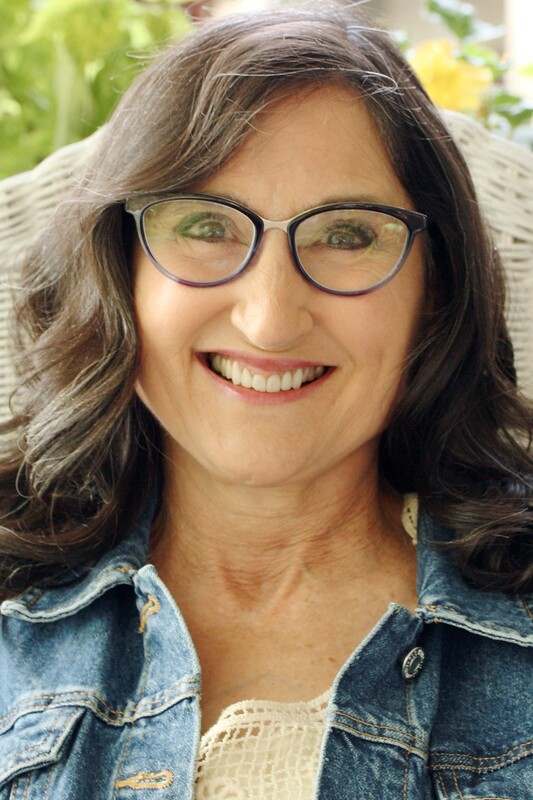|
What if I told you there was a civil rights leader who mentored Rosa Parks years before the Montgomery Bus Boycott? Who spent the early 1940s in small towns across the south, calling on barber shops, beauty parlors, grocery stores, churches, talking with sharecroppers, talking about how black people could fight Jim Crow. And who convinced Dr. Martin Luther King, Jr. that blacks needed a civil rights base in the south like the NAACP in the north, but more activist. And urged an initially reluctant King, then a young minister, to capitalize on the momentum of the bus boycott and expand protest throughout the south. You are probably guessing this is a woman. And you would be right. 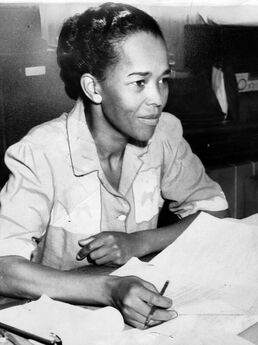 Ella Baker, Afro Newspapers, Gado/Getty, Sept. 18, 1941. Ella Baker, Afro Newspapers, Gado/Getty, Sept. 18, 1941. Ella J. Baker was known as a difficult woman. She didn't care. Working for the NAACP 1940-1946, she encountered men who doubted women's capabilities and who wanted to hold tight to their hierarchical structure and middle-class membership. Ella wanted to involve poor blacks and women, and she believed ordinary people could organize and lead themselves and change unjust structures in society. She also didn't care that her accomplishments went unnoticed. She worked behind the scenes helping people empower themselves, saying "Strong people don't need strong leaders.” In her years of grassroots work for the NAACP, Ella admitted the seemly endless small church meetings could often be “more exhausting than the immediate returns seem to warrant, but it’s a part of the spade work....Give light and people will find the way.” By 1946, Ella had become so fed up with the NAACP for it's resistance to grassroots organizing and lack of inclusion, she quit. Though she still participated in the local chapter where she lived in New York. Ella Baker, standing third from the right with a group of girls at a fair sponsored by the NAACP, early 1950s, courtesy New York Public Library. After the Montgomery Bus Boycott, a group of sixty black ministers gathered for a conference and founded the Southern Christian Leadership Conference to coordinate civil rights protest activities across the South. It was Ella's idea. Not to sound like a school kid, arguing about who had an idea first, but leaving Ella out of the story of the SCLC is like forgetting you have a backbone. Dr. Martin Luther King, Jr. is lauded by everyone as the SCLC's first president. Google its founders and you'll find the names of Bayard Rustin, Ralph Abernathy, Fred Shuttlesworth and others. And others is Ella Baker. In 1960, when the Greensboro Four staged a sit-in at a Woolworth's lunch counter, Ella had served two years as SCLC Executive Director. She saw the energy and commitment of the students staging sit ins. She saw their potential and wanted to support them. 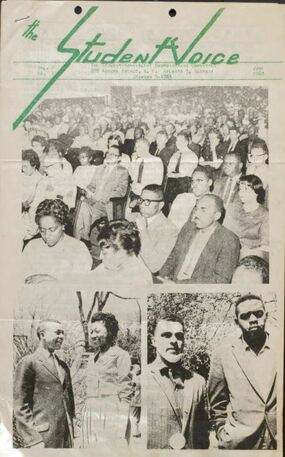 Student attendees at the conference show in the first issue pf SNCC's newspaper. Student attendees at the conference show in the first issue pf SNCC's newspaper. Within three months she organized a conference of hundreds of college students.“[I] felt there had to be some contact between the various student groups which had sprung up, or they might peter out of a lack of the nourishment of ideas and sustenance of morale that come from such contacts.” Diane Nash attended. “We felt a real kinship with the students who were working in other cities, to bring about the same things that we were.” Ella urged the students to see the sit-in movement as “bigger than a hamburger or even a giant-sized coke....[But as a movement to scourge America] “of racial segregation and discrimination – not only at lunch counters, but in every aspect of life.” From this gathering of students sprouted the Student Nonviolent Coordinating Committee, SNCC, pronounced "Snick." Built from the bottom up, SNCC turned the tide of the Civil Rights Movement to direct action. To protests, sit-ins, the Freedom Rides against segregation, the 1963 March on Washington and Freedom Summer voting registration drives in Mississippi. Martin Luther King had wanted the students to become become an arm of the SCLS, but Baker urged them to form their own group, and to include women and the poor. She clashed with King, pushing for more voices to be heard, and for more people to be empowered. "To be very honest, the movement made Martin rather than Martin making the movement." Ella said once. "This is not a discredit to him. This is, to me, as it should be." Scholar Cornel West says Ella was like a jazz musician. "She's antiphonal, call and response, she's in conversation. She's not pontificating from above, she's having conversation on a horizontal level." “I wasn’t one to say yes, just because [an idea] came from Dr. Martin Luther King, Jr. I was not an easy pushover," Ella said. "It’s a strange thing about men,… if they haven’t ever had a woman say no to them, they don’t know what to do sometimes.” Andrew Young articulated the feelings of the male leaders about Ella Baker. "The Baptist church had no tradition of women in independent leadership roles, and the result was dissatisfaction all around." Ella resigned from the Southern Leadership Council to work with the SNCC young people, shock troops in the battle for equal rights. “The young people were the hope of any movement…They were the people who kept the spirit going," Ella said, "the average Baptist minister didn’t really know organization.” Perhaps the influence of Ella's enslaved grandmother helped her speak up and believe in fighting for equality. Her grandmother was offspring of a slave and master. And because of that, the day after her birth the jealous mistress of the plantation poisoned the newborn's mother. Ella listened to her grandmother's stories of resilience and bravery, of being raised in slave quarters and put to work in the big house. "But at the point at which she was of marriageable age...the mistress wanted to have her married to a man whom we knew as Uncle Carter. He was also light. And she didn't like Carter. And so when she refused to concur with the wishes of the mistress, the mistress ordered her whipped, but the master, who was still her father, refused to have her whipped." Instead of the whipping, Ella's grandmother was forced to plow in the fields. When plowing began each year February, it was so cold she'd have to stop work to warm her hands on the horse's belly. Ella said, "I've heard her say that she would plow all day and dance all night. She was defiant." The SNCC flourished with Ella Baker's guidance and encouragement. It grew quickly in the fertile soil of all that spade-turning Ella had done in the 1940s. Diane Nash, (in photo) explained how Ella inspired her. “I could count on Miss Baker being truthful and she would explain many things very honestly to me, and I would leave her feeling emotionally picked up dusted off and ready to go.” Another young woman who was there at the founding of SNCC, Bernice Johnson Reagon, took Ella's words and set them to music. Struggling myself don’t mean a whole lot I come to realize. That teaching others to stand up and fight is the only way my struggle survive The anthem of freedom, Ella's Song, recorded by "Sweet Hone In The Rock" still rings true today. We who believe in Freedom cannot rest until it comes Until the killing of Black men, Black mothers’ sons Is as important as the killing of White men, White mothers’ sons. People called Ella Baker by the nickname Fundi, a Swahili word for someone who teaches a craft to the next generation. She continued to work for civil rights until her death on her 83rd birthday in 1986.
The more recent civil rights groups Occupy and Black Lives Matter Global Network embrace Baker's organizational ideals. Both have been criticized for their lack of leadership. Patrisse Khan-Cullors, one of the founders of Black Lives Matter responded by saying, "We are not a leaderless movement, we are a leaderfull movement." We shortchange ourselves when we overlook the leadership of Ella Baker. Yes, because she is an example of a powerful black woman, and a woman who maneuvered her way through gender stereotypes, but also because the work of her life demonstrates that successful enterprises need various kinds of leadership, that investing in a charismatic leader without cultivating a leadership base may jeopardize the cause. Tell me what you think! Did you know all this about Ella Baker? Leave your comment below. I'm sure glad I stumbled on her name and dug deeper. It gives me pause now, to think how often I've longed for a charismatic leader to pull Americans together to work for justice, and to take climate change seriously. Sources: https://www.smithsonianmag.com/history/long-lasting-legacy-great-migration-180960118/ https://snccdigital.org/people/ella-baker/ https://ellabakercenter.org/about/who-was-ella-baker https://kinginstitute.stanford.edu/encyclopedia/baker-ella-josephine https://ncwomenofcivilrights.wordpress.com/ella-baker/the-sclc-and-the-birth-of-sncc/ Comments are closed.
|
I'm fascinated to discover little-known history, stories of people and events that provide a new perspective on why and how things happened, new voices that haven't been heard, insight into how the past brought us here today, and how it might guide us to a better future.
I also post here about my books and feature other authors and their books on compelling and important historical topics. Occasionally, I share what makes me happy, pictures of my garden, recipes I've made, events I've attended, people I've met. I'm always happy to hear from readers in the blog comments, by email or social media. Archives
September 2023
Categories
All
|
